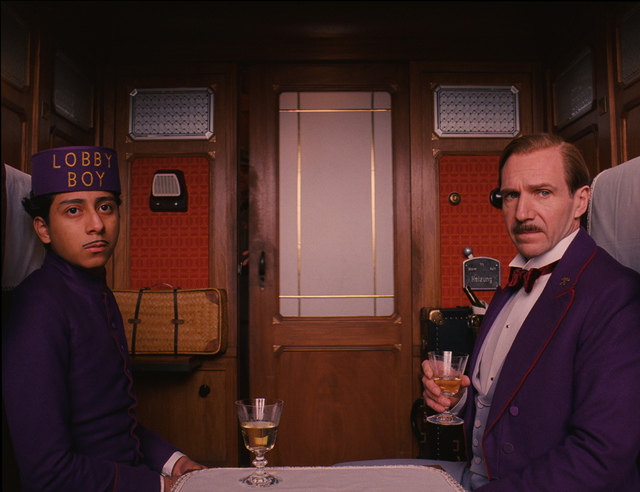Grand cast makes ‘The Grand Budapest Hotel’ a grand ol’ time

Prepare to be transported to an era when staying in a hotel was considered exotic, romantic, even something of an adventure, and not just another sleepless night because you can’t stop worrying about the potential for bedbugs or who did what to whom on that bedspread that keeps brushing up against your lower lip.
“The Grand Budapest Hotel,” the latest from writer-director Wes Anderson, is every bit as charming, delightful and eloquent — grandiloquent even — as you’d expect from the mind responsible for “Rushmore,” “The Royal Tenenbaums” and “Moonrise Kingdom.”
Ostensibly the story behind a beloved novel, the film opens in 1985 with its author (Tom Wilkinson) recounting his time in the once-magnificent hotel in 1968. Portrayed as a younger man by Jude Law, the author strikes up a conversation with the hotel’s owner, Zero Moustafa (F. Murray Abraham), concerning his rise from junior lobby boy in training to proprietor.
But all that’s really just an excuse for Anderson to stage an array of thefts, murders, chase scenes, conspiracies, a ridiculously elaborate prison escape, octogenarian sex (thankfully offscreen) and plenty of moments in which Ralph Fiennes is hilariously fussy.
In 1932, a young Zero (newcomer Tony Revolori) has escaped his war-torn homeland to apprentice at the Grand Budapest Hotel, in an eastern-European spa resort in The Republic of Zubrowka. There, he’s taken under the wing of the hotel’s legendary concierge, Gustave H. (Fiennes), whom Zero recalls as “the most liberally perfumed man I have ever encountered.”
Gustave is quite the ladies man, at least among ladies who have one foot in the grave. Soon after sending home his current flame, 84-year-old Madame Celine Villeneuve Desgoffe und Taxis (Tilda Swinton), Gustave learns of her death via a headline in the Trans-Alpine Yodel.
When Gustave inherits her most valuable possession, Johannes van Hoytl’s painting “Boy with Apple,” Gustave and Zero abscond with it before her villainous son Dmitri (Adrien Brody) can challenge the will and its executor, Deputy Kovacs (Jeff Goldblum). Then Gustave is framed for her murder.
From there, Gustave and Zero are pursued by the captain of the Lutz Military Police (Edward Norton), as well as a ruthless killer (Willem Dafoe) who looks like a cross between Eddie Munster and Eddie Izzard. Gustave ends up in prison with a bald, shirtless, tattooed underworld boss (Harvey Keitel). And Zero falls in love with Agatha (Saoirse Ronan), an apprentice at Mendl’s Patisserie who has a giant Mexico-shaped birthmark covering her cheek.
“Grand Budapest” is overflowing with talent, even before taking into account the cameos by several members of the Wes Anderson Players, including Bill Murray, Owen Wilson and Jason Schwartzman.
In both his writing and directing duties, Anderson is every bit as fastidious as the absurdly proper Gustave. Anderson’s vision of the Grand Budapest is as extravagant in 1932 as it is shabby in 1968. He constructs such elaborate soliloquies, it’s surprising the actors didn’t require oxygen tanks to finish them. He also makes great use of trains, a toboggan, a ski gondola and a funicular. And, really, who among us doesn’t appreciate a good funicular?
“Grand Budapest” is assembled as delicately as those tiny pastries from Mendl’s, as though one false move would collapse the entire thing.
As stylized as Anderson’s movies tend to be, though, he may have topped himself by filming each era of the hotel’s story in a different, decade-specific aspect ratio. (What this means to non-film-nerds is that during Gustave’s exploits, the footage is basically square.)
“Grand Budapest’s” greatest stunt, though, is in the casting of Fiennes. Known primarily either for his fine early work in “Schindler’s List” and “The English Patient” or his later role as “Harry Potter’s” Voldemort, he’s always been a terrific actor.
He’s just never been this funny, as he deftly unearths the humor in Gustave’s situation without hitting the notes too hard. As Gustave, Fiennes feels like someone who not only would have been on a movie screen in 1932, he’d have been a star.
It’s far too early to be talking about Oscar possibilities, but if there are five better performances in 2014, we’re in for a heck of a year.
Anderson can be a polarizing figure, having rabid fans as well as passionate detractors who find everything he does a little too precious.
But aside from “The Lego Movie,” there’s more creativity and inventiveness on display here than in the rest of last weekend’s top 10 box-office draws combined.
If there’s a complaint, it’s that “The Grand Budapest Hotel” suffers from a rather abrupt ending. It feels as though everything is building to something bigger than it really is.
As a result, when checkout time rolls around, odds are you’ll wish you could extend your stay.
Contact Christopher Lawrence at clawrence@reviewjournal.com or 702-380-4567.